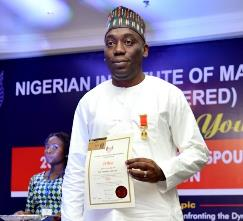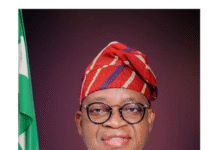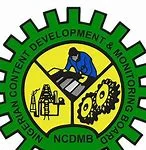The Nigerian Ports Authority (NPA) has made public its decision to raise its tariffs. The upward review of the tariff is coming 32 years after it was last reviewed by the authority.
Maritime Bits checks revealed that the last time the management of the money spinning government parasatal carried out a review of its tariff was in 1993.
The management of the authority which presently has Dr. Abubakar Dantsoho as its Managing Director and Chief Executive Officer (CEO) said the review will help it to speed up with those of its peers in terms of infrastructure and equipment.
Apparently justifying the increment, the authority in a statement made available to Maritime Bits said the 15 percent upward increase which will cut across all NPA rates and dues is premised on the urgent need to address what it called “undesirable reality of aged and weak infrastructure, obsolete equipment and slow port capacity expansion” which has continued to diminish the performance and indeed competitiveness of Nigerian ports.
It explained that globally, port authorities depend on revenue from operations to stay alive to their responsibilities which include construction and maintenance of port infrastructure, dredging of channels, provision of aids for safe navigation, provision of modern marine crafts for efficient harbour services, automation and digitization of port transactions, port security, energy efficiency and training and retraining of its employees.
It also stated that global index of port rating and competitiveness which the international trade community relies on for its choice of countries to do business with, derives its data from how well the aforementioned responsibilities are addressed.
Giving further insight into why it took the decision, the management of the authority said: “Coming at this period of global economic upheaval and scramble for markets, this belated tariff review borne out of necessity constitutes a critical success factor in Nigeria’s quest to win back cargo handling business and it is accompanying benefits including job opportunities it had lost to its maritime neighbours.
“Contrary to the popular but erroneous notion that attributes high port costs to NPA relative to its peers, verifiable data shows NPA tariffs are amongst the lowest in the region. The high incidence of un-receipted costs due to unduly high human interface, bureaucratic bottlenecks, functional overlaps resulting from absence of a Port Community System (PCS) and its corollary the National Single Window (NSW) are responsible for this contrived falsehood”.
According to the management of the authority, although long overdue, a quick win benefits of the NPA tariff review for stakeholders, is the immediate boost it gives to the authority to fast track the commencement of actual works on its concluded port reconstruction and modernization plans. Secondly, the tariff review provides the necessary guarantees to fund the acquisition and urgent deployment of the Information Communications Technology (ICT) backbone of the PCS which is the precursor to the implementation of the NSW.
It also explained that the increased revenue generation arising from the review will buoy NPA capacity for critical maintenance works to open up the Eastern Ports for increased vessel and cargo traffic such as the reconstruction of collapsed Escravos breakwaters and tackling the challenges at Onne and Calabar ports.
Maritime Bits recalls that at a stakeholders meeting in Lagos recently, Dantsoho represented by NPA Executive Director, Marine and Operations, Mr. Olalekan Badmus, said the management decision to meet stakeholders was borne out of desire to carry everyone along in the scheme of things.
A stakeholder in the maritime industry, Mr. Joshua Asanga agreed with the increase just as he added that the value of NPA present tariff has since been suppressed by inflation which is at about 35 percent.
Asanga who was a former Port Manager, Lagos Ports Complex (LPC), Apapa, Lagos stated that port management liabilities like wages, fuel and other areas of expenditure as having adjusted upwards without a commensurate rise in NPA charges for over 30 years
He added that NPA needs funds for improved port infrastructure, robust ICT for PCS, procurement of tug boats and other operational platforms to achieve efficiency
Also speaking, another stakeholder, Mr. Demian Ukagu spoke on the need to apply more NPA funding to outer port facilities and jetties such as Kirikiri Lighter Terminal (KLT) and development of other critical port facilities across the country.
He added that NPA rates should be able to cover these cost that would guarantee minimum return on investments and promote sustainable trade.
Participants at the meeting agreed that existing tariffs were set devoid of capital cost, labour cost, consumables and overhead expenditures needed to run the ports.
According to them, keeping the ports on the old tariff will led to severe consequences such as poor services, inadequate infrastructure, poor remuneration, obsolete critical port facilities, equipment and infrastructures in the years ahead.











